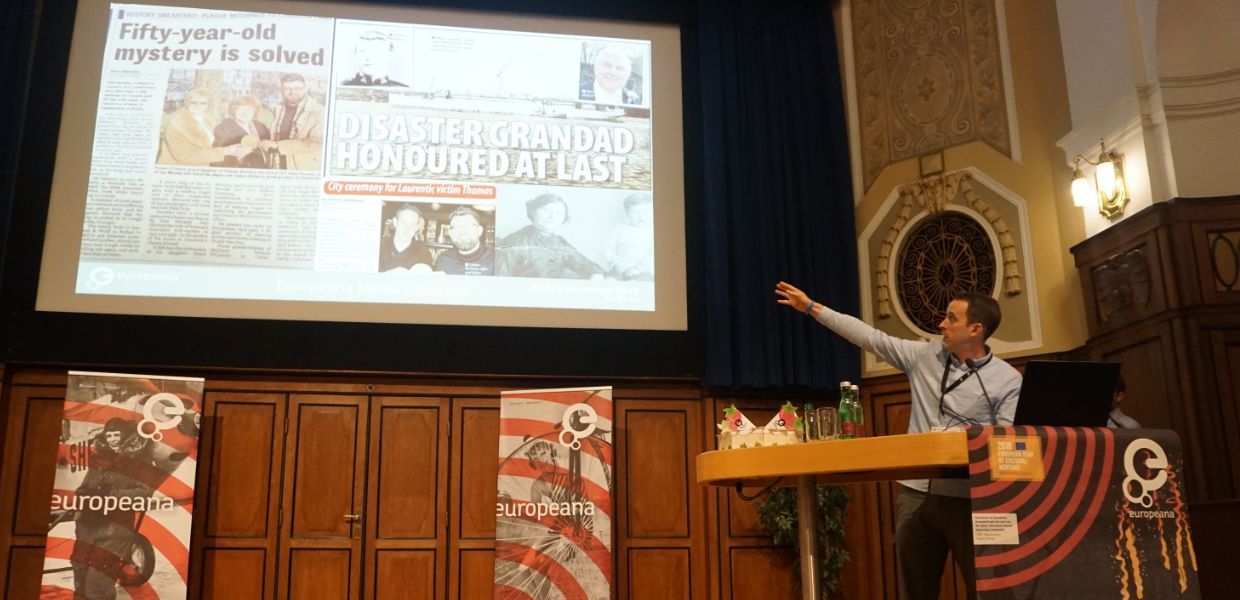Professionals in Focus: Killian Downing
Europeana Members Councillors have diverse jobs and wide experience across the heritage sector, but are united by their passion for digital cultural heritage. In our ‘Professionals in Focus’ series, we speak to our Councillors about their roles, working lives and plans for their time on the Members Council. This month Killian Downing, Archivist at Dublin City University, discusses the importance of open access, his work with cultural heritage professionals in Ireland, and his involvement with Europeana communities.

- Title:
- Killian Downing, National Archives of Ireland, presents at Europeana AGM 2018
- Date:
- December 2018
- Institution:
- Europeana Foundation
- Country:
- The Netherlands
- Copyright:
- CC BY-SA
About Killian
Archivists come from weird and wonderful backgrounds. As a music student at Maynooth University, studying musicology and creative music technologies, I worked part-time in Dublin Zoo and Dublin City Public Libraries. Much of this time was spent at the welcoming desk of Dublin City Archives where I was enthralled by vistor’s stories, artefacts, and their desire for sharing and learning about the past. As a career in Dublin Zoo didn’t materialise, I graduated as an archivist and records manager in 2010. Ten years on, I still visit my furry friends in Dublin Zoo.
What are you currently working on?
I’ve recently been appointed as an archivist in Dublin City University Library and am really excited to be taking up this role. DCU is an internationally renowned university with extensive collections on modern Irish history, politics and society. I’ll be working with the DCU library team to open up its collections, foster new academic and research partnerships, and connect with existing and new communities.
As a councillor with Europeana, I’ve been working with a passionate network of professionals in Ireland to develop a collective strategy to support the visibility, usability, and long-term sustainability of digital cultural heritage and consolidate Ireland’s ongoing cooperation with Europeana.
What are some of the challenges in your role? What are some of your favourite elements?
For GLAMs, one of the biggest challenges and, paradoxically, one of the biggest opportunities, is the way in which rapid technological change is being exacerbated by mis and disinformation online and lazily amplified as ‘alternative facts’. The digital culture heritage sector has huge potential and a responsibility to provide information literacy tools to empower users to evaluate and interrogate information online. Freedom of access to archives, records and information is vital for an open, knowledgeable and democratic society.
Now more than ever, GLAMs need to collaborate and develop trusted capabilities to ensure records are preserved, authentic and usable over time. Where traditional values of openness, transparency and accountability are also challenged by rapid technological change, the international movement embracing open access, open GLAM and open cultural heritage is reconciling this trust.
With many of us in lockdown, a massive challenge for GLAMs and cultural organisations is how to renew their relationship with their audiences. The Europeana Impact Community has been addressing this challenge and provides free tools and resources so cultural institutions can evaluate and articulate their relevance to their audiences.
What was your motivation for joining the Members Council?
I’m quite new to Europeana. My first experience was sharing a story about a WW1 memorial plaque dedicated to a HMS Laurentic fireman named Thomas McGarry via Europeana 1914-1918. The story was later discovered by McGarry’s grandchildren on Europeana and the lost plaque was returned to them before the centenary of his death in 2017. The return of this object made me realise how Europeana is a home for our collective memory and shared heritage, allowing us to understand the complexities of our past to make sense of the present.
What do you plan to do as a Members Councillor?
Working in Ireland, I’ve been promoting and coordinating Europeana collection days and engagement events. Thanks to the establishment of the Digital Repository of Ireland (DRI) as the national aggregator for Ireland, there’s now nearly 100 ENA members across Ireland and ten collection days have occurred. About to kick-off is the Europeana Sport: Ireland’s Stories campaign, to be followed by Europe at Work: Ardnacrusha Memories - Collecting your stories about the Shannon Hydro-Electric Scheme.
Working with Europeana, I’m Chair of the New Professionals Task Force which aims to better support young and new professionals within Europeana in a time of growing work casualisation and job insecurity. This Task Force will assess the challenges facing emerging professionals and aims to deliver recommendations for a new professionals programme. I’m also co-Chair of the Europeana Communicators Community and member of the growing Climate Action Group, which is pursuing collective action within the ENA and wider Europeana community in solidarity with the global climate justice movement.
Being new to the ENA, I never expected to be elected as a councillor in 2018. I would encourage anyone who wants to help shape Europeana and join a community of passionate, open, and friendly people to put their name forward in the November 2020 Members Council elections.


